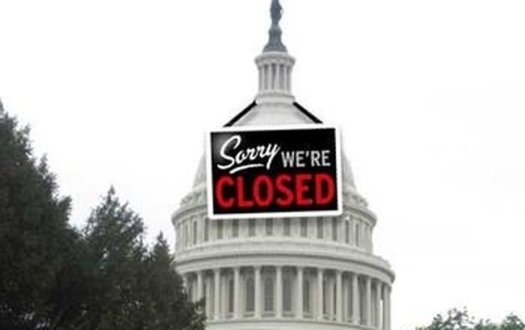
Chabad Lends Hand to Furloughed Government Workers
Sure, it may have been fun at first: a couple of days off to catch up on errands or yard work, or visit family. But as the U.S. government shutdown enters its third week—it officially began at 12:01 a.m. on Oct. 1—federal employees are starting to feel the backlash of being caught up in a partisan battle over government spending.
Among those affected by the furlough is Baltimore resident David Bernstein, who has been putting his unanticipated time off to good use. He spent what ordinarily would have been a work day helping his local Chabad rabbi take down sukkahs that had been erected at public venues around the city.
“I’ve helped him before with various things. I even helped him build the sukkahs before the furlough, and since I had extra time now I offered to help him out any way I could,” he says. “It was no big deal.”
But it certainly was a big help to Chabad of Downtown Baltimore’s Rabbi Levi Druk, who noted that it normally takes him a week to take down all the sukkahs. With Bernstein’s help, it went much faster. “He’s a guy who always wants to give and do,” says Druk.
Bernstein was also able to go and help out his father in Florida for a few days.
He hopes to return to work quickly, yet without access to his office email and phone—he had to temporarily turn in his government-issued BlackBerry—finding out what’s going on isn’t easy. For instance, he spent more than two hours on a recent morning trying to figure out if he would be receiving a paycheck for the hours he worked before the shutdown. The analyst with the Social Security Administration ultimately determined that he would indeed get paid now for that time.
According to Rabbi Kushi Schusterman of Chabad of Harford County in Bel Air, Md., the furlough’s impact is different for every person in his community; for some, the time off “has been a blessing in disguise because they can get to projects” they’ve had waiting in the wings. But, he continues, no one likes being out of work for an extended period of time.
The uncertainty in this case is especially hard; people want to know how to plan and schedule their lives and finances.
While many federal employees are still waiting to get back to their jobs, military employees, including civilian workers like Michael Barnett, who attends programming at the Harford Chabad, have returned to work.
But that doesn’t mean Barnett’s concerns are over. “There were four days of lost pay, and that certainly affected me,” he says.
Then there’s the logistical side; he doesn’t know when the particular project he’s working on will receive funding. “That’s a serious concern,” he says.
Sharing Their Concerns
Elsewhere, Rabbi Sholom Deitsch of Chabad of Northern Virginia says that quite a few members of his Chabad center in Fairfax are out of work because of the furlough. While he believes that most people are OK for the moment, the rabbi has had a few requests for assistance from those who don’t know when they will get another paycheck.
“Whether it was for a class, or families who are on a schedule to pay for preschool or camp, they asked us to extend [the due date] because they don’t have access to the money they were counting on right now,” says Deitsch. “And we, of course, as any Chabad center would, are accommodating them to their needs, whatever their needs are in this situation.”
It’s a sentiment echoed by Chabad rabbis throughout the Greater Washington D.C. area. Says Rabbi Nochum Katsenelenbogen of Chabad of Owings Mill in Maryland: “We all share the concern of everyone in the community who is furloughed and not getting paid right now, and we are very accommodating to that.”
Schusterman in Bel Air adds that “if they are a federal employee, we won’t push them to pay a bill or even a suggested fee or donation. For us, it’s more important that they or their families attend a class or a community dinner, Hebrew school or a women’s program.”
Though money is certain to be a big concern the longer the shutdown continues, finding ways to occupy the time of those furloughed is also an issue. Deitsch plans on offering daytime shiurim, or classes, beginning on Monday—coincidentally, Columbus Day, a national holiday—if the situation is not resolved by then.
Given that members of Congress are at least talking to one another now, most are hopeful that the shutdown will end sooner rather than later, so everyone can return to their normal routines.













